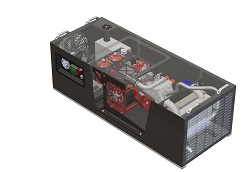Hydrogen-based innovation could help shipping go green
Supply shortfalls during the COVID pandemic provided a timely reminder of the vital role that transport plays in global trade. Population growth and rising demand for energy and consumer goods will only increase pressure on the sector, most notably shipping. “Ships transport nearly 90 % of the world’s trade volume and about 70 % of trade value,” notes HyMethShip(opens in new window) project coordinator Igor Sauperl from LEC(opens in new window), Austria. “Waterborne transport remains essential to the global economy.” At the same time, the world is waking up to the urgent need for climate action. For the shipping sector, this means significantly reducing greenhouse gas emissions and water pollution. In 2018 for example the International Maritime Organization(opens in new window) (IMO) adopted a resolution to decrease the emissions of greenhouse gases from marine transportation by 50 % by 2050. “We need a combination of innovative solutions such as next-generation fuels, new propulsion concepts and ambitious regulations to effect the change we need,” explains Sauperl. “Several possible solutions are currently being worked on, among them the HyMethShip system.”
Hydrogen-powered shipping
Launched in July 2018, the ambitious HyMethShip project sought to drastically reduce emissions and improve ship efficiency by developing CO2-emission-free hydrogen combustion in an internal combustion engine. The proposed solution reforms methanol to hydrogen, which is then burned in an engine that has been upgraded to burn multiple fuel types and specially optimised for hydrogen use. This complex and challenging objective brought together industry and research institutions from across Europe. “Project partners covered the whole value chain, from engine manufacturers and component suppliers to ship designers, shipyards and classification societies,” adds Sauperl. The hydrogen-fuelled combustion system was developed using 3D simulation and experimental investigations on a single cylinder research engine. The technology was then demonstrated onshore using a typical (and easily further enlargeable) engine for marine applications – a 2 MW large-bore engine. At the same time, a membrane reactor for methanol steam reformation and hydrogen separation was developed. The engine and reactor were then integrated with heat recovery and carbon capture technology, designed to achieve significant energy efficiencies and emissions reductions. Issues such as on-board installation, integration and operation were assessed, along with environmental sustainability.
Boosting European shipping
Thorough onshore tests succeeded in demonstrating the huge potential of the HyMethShip system. Areas for further improvement were also identified during the test phase. “Engine operation with pure hydrogen fuelling was achieved while complying with IMO emission limits,” says Sauperl. “We also showed that the carbon-based membranes could produce a high-purity hydrogen stream.” The project team is therefore confident that the HyMethShip concept will go on to help the sector – especially medium- and long-distance shipping – to achieve significant CO2 emission reductions in an economically efficient way. “Introducing green hydrogen-based fuels for marine propulsion would open up new opportunities in a market currently dominated by fossil fuels,” adds Sauperl. Next steps include developing a full-scale vessel application, which would be tested and trialled on board a ship. “Immediate integration onto a ship in this project would have been far too costly,” remarks Sauperl. “At present, potential scenarios are being worked out with several consortia, with the concrete target for the maiden voyage planned for 2025/2026.” By introducing a completely new approach to ship propulsion based entirely on renewable energy, the HyMethShip undoubtedly represents an important milestone in shipping technology. “Sustainable solutions of this kind will help to increase European innovation potential, and further strengthen the competitiveness of our shipping industry,” says Sauperl.







